It’s never been a better time to “clean up your act” with business reviews and rankings. We all know, in the past, and still today, Google and other platforms rank businesses and show their ratings, where consumers prefer businesses with higher rankings. But now we have Generative AI like ChatGPT being trained off those reviews and recommending businesses with better ratings. Therefore, if you don’t want to miss out, you’d better straighten up and take care of your reviews now.
Overview of Online Reviews Industry
Online reviews and business rankings play a crucial role in the success of businesses today. Review networks provide a platform for customers to share their experiences and interactions with businesses, and influence the decisions of potential customers and clients. By actively managing and responding to positive and negative online reviews, businesses can maintain a strong online visibility, build trust, and drive sales. In order to protect your online reputation, it is necessary to flag down and remove negative online content and reviews if they violate network’s rules.
Online Reviews Importance by The Numbers

According to Forbes, over 90% of consumers read online reviews, and 75.5% of them trust these reviews when making purchase decisions.
Reviews can play a crucial role in a business’s success, especially when attracting top talent. In fact, according to studies, 70% of the strongest candidates won’t accept a job offer from a company with bad ratings and reviews on platforms like Glassdoor.
We created several case studies to demonstrate the impact of online reviews. In one case, a local restaurant saw a 20% increase in online reservations and over 35% increase in foot traffic to the bar after improving their ratings on networks like Google and Yelp. Another case study highlighted an auto dealership that experienced 15% increase in revenue and sales after improving their online reviews and star ratings.
For B2B sales, research indicates that 7 out of 10 B2B buyers conduct research before contacting a company’s sales department to initiate the purchasing process.
Many business owners find managing and replying to online reviews time consuming. However, the data and research provided make it clear that prioritizing the management and response to online reviews, including flagging, reporting, and deleting bad and fake reviews, is highly important for business success.
Having stellar online reviews can perfectly act as an additional salesperson for your company. With higher conversion rates brought by positive reviews, you can even reduce your marketing spend.

We specialize in removing negative, unjust, misleading, and fake reviews about your company. You only pay when the removal is successfully confirmed.
Types of Websites That Publish Online Reviews
Many types of online platforms collect and display reviews. Beyond dedicated review sites, social networks, forums, discussion boards, and even blogs with comment sections can serve as venues for users to share their opinions about businesses, products, or services. Many of these sites rank well on search engines like Google, meaning they often appear in search results when people search for business names or compare products or services.
Here are the most common places for online reviews:
- Business directories, Local and Maps, like Google My Business (Google Maps) or Yelp where businesses are listed, and customers and clients can rank them and leave reviews about experiences.
- Retail websites and platforms like Amazon, eBay, Walmart and other e-commerce sites where customers can review products they purchased and their interaction with businesses.
- Travel review and booking websites like TripAdvisor, Expedia, Booking.com, Airbnb, and others where travelers can review hotels, hosts, restaurants, and other travel related businesses and service providers.
- Social media networks Facebook, Instagram, or Twitter where users allowed to leave feedback and reviews on business pages.
- Job networks and review sites like Glassdoor or Indeed where current or former employees, people who interviewed with the company, can review their employers, interview process and share their experiences.
- Popular Discussion Boards and Communities. Sites like Reddit, LiveJournal, Pinterest, or Quora where users create interest group and discuss different topics.
- Online complaint sites where customers can express their dissatisfaction with products or services they purchased, like RipOff Report or Better Business Bureau (BBB).
- Niche websites that focus on specific industries, like Capterra or G2 for software buyers, local services Angie’s List, DealerRater for car buying experience.
- GenAI platforms, they don’t collect user generated content but scan other websites and display reviews and ratings in their recommendations.
How AI Platforms Are Shaping the Impact of Online Reviews
AI platforms such as ChatGPT, Google Gemini, DeepSeek, and Bing Copilot integrate online reviews into their search results. They analyze these reviews to provide the most accurate responses and recommendations for user queries. As a result, the importance of online reviews has grown significantly, with more consumers relying on AI platforms for reviews and advice when making decisions.
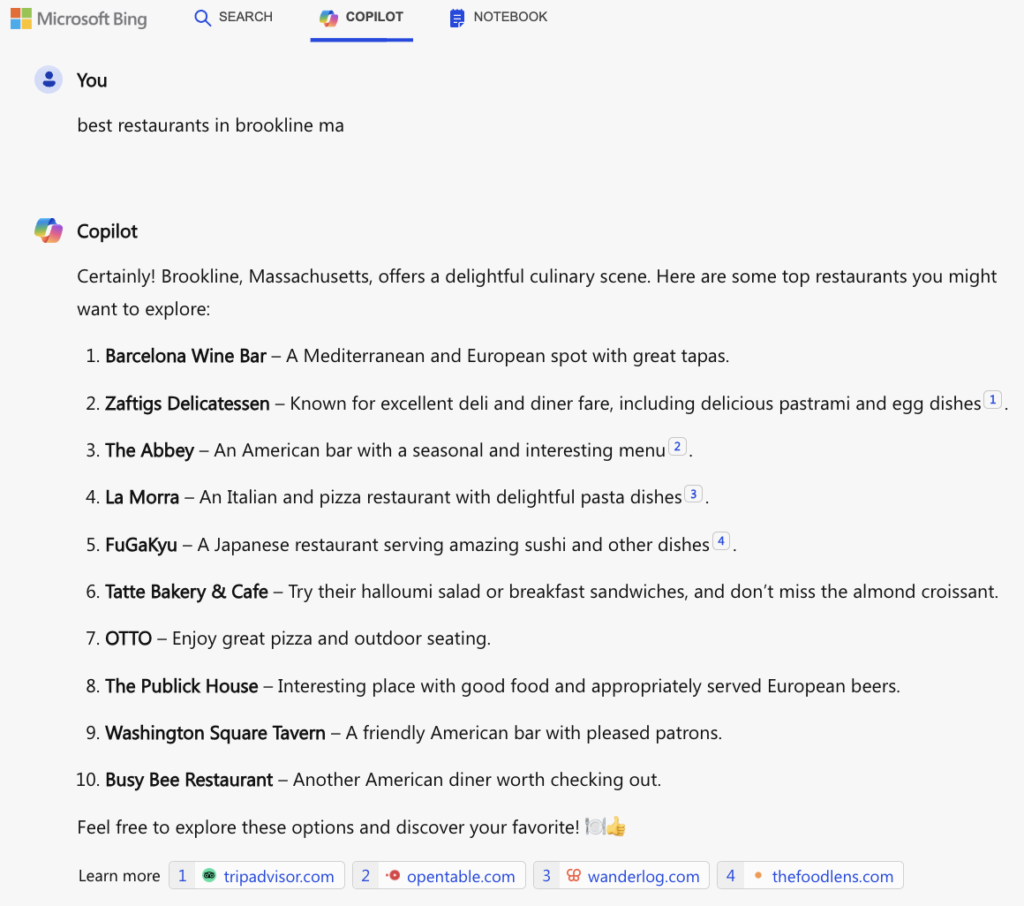
Microsoft Bing Copilot for example, gives results for best restaurants in a local area and links to popular review platforms like TripAdvisor, OpenTable, and others.
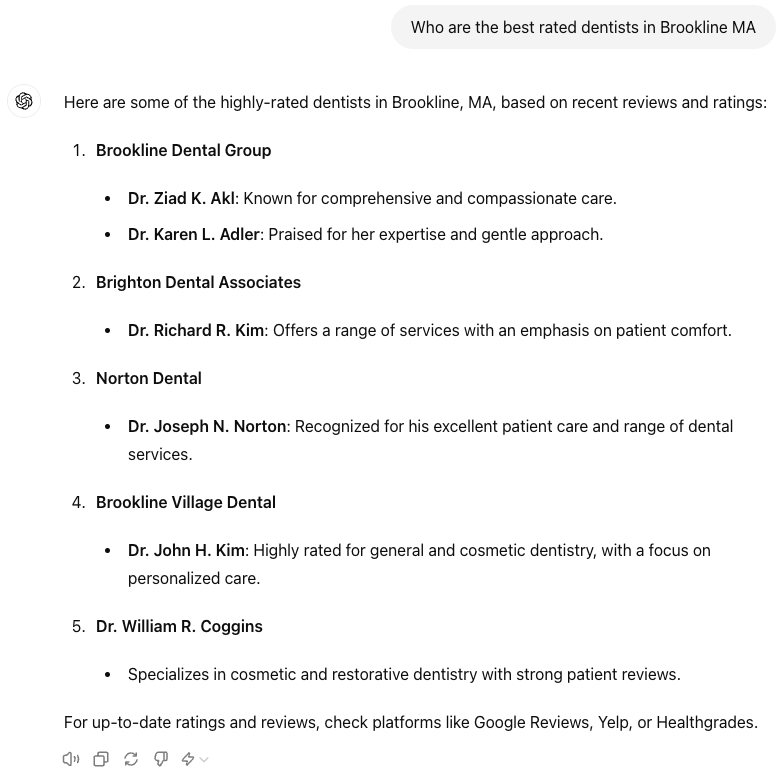
At the same time, ChatGPT gives review suggestions for Google Reviews, Yelp, and HealthGrades when searching for local doctors.
That’s why, when talking about GenAI optimization, review networks are becoming even more important than search engine optimization or social media management.
Who Can Write Online Reviews?
Online reviews can be written by anyone who interacted with your business, including clients, customers, employees, or anyone who has used your products and services. However, due to the anonymity of the internet, even people who are unfamiliar with your business can write reviews as well. This anonymity is often exploited by “bad actors” such as spammers, scammers, trolls, or disgruntled employees. Here is the list who is most likely to write a review for a business:
- Customers. People who share their experiences with products or services they purchased from businesses.
- Unhappy customers are seven times more likely to leave a negative review.
- Clients and business partners. People can write reviews about professional interactions and collaborations with the business owner, employees, or customer support.
- Employees. Current and former employees can review their employment experience, provide insights into the work environment, what to expect and company culture.
- Competitors, spammers, scammers, and trolls. Unfortunately, competitors or individuals with malicious intent can also leave reviews, which can sometimes be fake and misleading. Our own report revealed that over 23% of online reviews are fake and only 54% can be trusted.
- Motivations behind fake negative reviews can be anything like competitors, extortion attempts, disgruntled employees, and or personal vendettas.
The True Cost of Scamming: How $4 Negative Reviews Can Ruin Your Business
Scammers offer their negative review writing services for as low as $4 per review, that’s the price to damage your business and hard work.
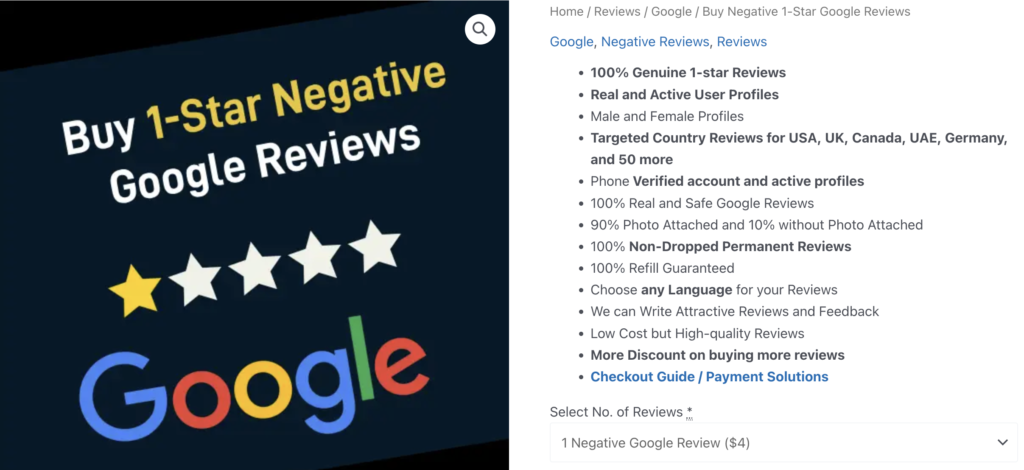
The screenshot above shows what we found in top 10 Googe results when you search to write fake negative reviews. As you can see, those people offering their services to damage your business for as low as $4. And their so called “services” come with guarantees that the fake review will be written from established accounts, targeted locations, hard to flag and remove etc.
You think scammers would operate on dark web marketplaces, but no, they are offering their services at incredibly low rates and it is easy to find them on networks like Medium, Reddit, Quora, and they even appear in organic Google search results. It makes it extremely easy and affordable for bad actors or competitors to damage a business’s reputation and undermine years of hard work.
The Psychology Behind Negative Reviews
The psychological impact of negative reviews on consumer behavior towards your business is huge. Negative feedback can create doubt and uncertainty in the minds of potential customers, influencing their purchasing decisions and hurting sales.
In our previous post, we discussed research showing that negative reviews can impact revenue by up to 30%. If negative reviews strike, it forces businesses to invest more in marketing and public relations efforts for damage control and to recover lost sales.
Also, research in consumer behavior suggests that negative experiences have a greater impact on customer perceptions than positive ones. That’s why, when customers are unhappy, they’re seven times more likely to write a negative review than when they’re satisfied. Just one bad review can outweigh the positive impact of forty good reviews. This phenomenon, known as negativity bias, means that people tend to remember and be influenced more strongly by negative events and feedback.
That’s why, addressing and flagging negative reviews is essential for mitigating their potential negative effects on your business reputation.
How to Handle Bad Online Reviews
Receiving a negative online review is never easy, whether it’s from a customer, client or a current/former employee. Even worse, when it’s a fake misleading review from a spammer, competitor, or troll.
Once you got a bad review, you have several options:
- Try to resolve the issue offline, a person might eventually remove it.
- Respond to the review with an explanation and try to resolve.
- Flag and appeal the review to network’s moderators to take it down.
- Contact the network if you believe that your business is under attack from spammers, scammers, or trolls.
In this blog post, we’ll help you navigate through the tough decisions involved in responding to negative reviews and finding the best solutions. You’ll learn how to report, appeal, and remove bad, misleading, or fake reviews, write effective responses, avoid mistakes, and even turn negative reviews into opportunities.
Claim Your Business Profiles and Start Managing Reviews
Before you start managing, reporting, and removing reviews, it’s important to claim your business profile on each network. By doing this, you take ownership of your profile page visible to customers on those platforms. Once you claim it, you can log in, update your profile with important information such as photos, logos, descriptions, website, business hours, and more. This will enable you to effectively manage existing and new reviews.
Additionally, claiming your profiles protects you from scammers and spammers who might take over your profiles or create duplicates. For complete guide on managing business profiles, check out our previous post here.
Can You Appeal and Remove Negative Reviews for Your Business or Service?
Yes, every major reputable review platform has an appeal process where you can flag, report, and appeal reviews that you believe are unfair, misleading, or violate their rules guidelines. Each platform has its own process, they are generally straightforward and easy to follow.
In fact, Google has strict rules against websites that charge for removing content or make it hard to appeal. If a review site demands payment to remove reviews or builds obstacles on appealing and removal process, you can report it to Google and request that Google remove their pages about your business from search results. Because of this, legit review platforms aim to keep their appeal processes clean and transparent to maintain strong positions in Google search and avoid any legal consequences.
How to Report and Remove Bad Online Reviews
The most effective way to manage your online reviews is directly through claimed business profile on each network. This way ensures you receive notifications about any updates, including newly posted reviews.
- Identify the review in Question. Carefully read the review to understand why it’s negative or misleading.
- Review the platform’s guidelines. Each online review platform like Google, Yelp, or Glassdoor has specific rules, guidelines and policies regarding what people can post when reviewing businesses, products or services.
- Understand if it’s fake review from someone who never interacted with your business, or genuine review from a real customer or client.
- Determine if the review violates the platform’s policies (for example, contains offensive language, post names, identifiable information, business secrets, spam, fake, conflicts of interest etc).
- Flag or report the review. Or use contact box or link to write to moderators.
Many platforms allow to flag and report reviews directly from the review section.
Look for links like “Report” or “Flag” next to the review, click the link, identify the most appropriate category why you are flagging the review, and write an appeal if there is an option. Provide the necessary details explaining why the review should be removed.

We help businesses in appealing and removing negative reviews about their company. Payment is only required upon successful removal confirmation.
Types of Online Reviews You Can Flag and Report
Each review network has it’s own rules and guidelines on what can be posted about businesses, products or services. Here is the most common rules most network follow:
- Offensive content, profanity. Reviews that contain offensive language, threats, violence, hate etc.
- Spam and fake reviews. Content that is not real or unrelated.
- Conflict of interest, when someone is affiliated with business or competitors.
- Illegal content. Reviews that contain illegal content or any illegal references.
- Off topic reviews that have nothing to do with business, products, or services.
- Buying, harassment, or identifiable information. Reviews that personally attacks specific individuals.
- Trade secrets, confidential information. Reviews that disclosure non public information about business.
- Accusations of illegal activity. If true, it needs to be reported to authorities, and not review sites.
- Personal Information such as address, phone, email.
Use common sense and see if the review negative but still genuine, and replying to that review actually makes sense. Or it is review that designed to harm your business and needs to be reported.
Tips to Improve Your Chances of Flagging and Appealing Negative Reviews
When you trying to flag and appeal negative review, it goes to moderators and there are strategies how you can present a better case to successfully appeal a review. Here are key tips to improve your chances of flagging and appealing negative reviews:
- Understand Platform Policies and Guidelines
Before taking any action, familiarize yourself with the review platform’s rules and guidelines regarding reviews. Each platform (such as Google Reviews, Yelp, TripAdvisor) has specific rules what can be written in the review. Understanding these guidelines increases your chances to get your review successfully removes - Timing Matters, When to Report a Negative Review Wisely
Take a breath and take some rest, don’t rush into reporting a negative review immediately. Writing an emotional appeal talking about its injustice, may not convince moderators. To win their support, focus on providing clear evidence that the review not only unjust but also violates the network’s rules and guidelines. Also, removing the review right away might prompt the reviewer to write a carefully worded new review that evades flagging. It’s often better to let them “cool off” before taking any action. - Build Strong Online Reputation and Positive Reviews on a Regular Basis
Anecdotally, businesses with a positive image and lot of good reviews often find that moderators take more time to review their appeal and are more inclined to agree with them, whereas those with a poor reputation may receive less support from the network. - Don’t Overwhelm Moderators With Too Many Requests to Remove Reviews
Making frequent requests and appeals to remove reviews for your business could backfire, moderators may start to ignore your requests, just like the “Boy Who Cried Wolf” story. Some networks may even go as far as banning your business profile if they perceive your actions as spamming. - Not All Negative Reviews Should be Flagged or Appealed
Flag only reviews that clearly violate platform guidelines, such as those containing hate speech, false information, or personal attacks. If the review is negative but well written and provide productive criticism wishing you and your company well, it’s better to keep it and respond professionally. It’ll show that you are willing to provide the best support and improve. A few negative reviews can be turned into your advantage. - Document Evidence for Appeals
Gather evidence to support your claim. This might include screenshots of inappropriate content, email correspondence with the reviewer, or proof of ilegal activity. - Follow Platform-Specific Appeal Procedures
Some review platforms have its own appeal process when your first flagging attempt was denied. This often involves filling out an appeal or contact form and providing additional information. Clearly explain why the review should be reconsidered and removed. - Stay Professional, Transparent, and Don’t Lie
Maintain professionalism through the flagging and appeal process. Avoid engaging in heated exchanges with moderators or responding defensively to negative reviews. Don’t engage in heated exchanges (online and offline) with people who wrote the review. Some networks contact the reviewer and your communication can be presented as an evidence on their side.
By understanding platform policies, responding promptly and professionally, and following proper appeal procedures, businesses can improve their chances of removing the negative reviews by network’s moderators.
How Long Does It Take to Remove a Review?
Each network has different rules. Some networks would review and respond within a few business days. Others will take time to investigate and even contact a person who wrote a review for an evidence.
For example, once you flag a review on Google Maps, it takes approximately 2-4 business days for moderators to review and make a decision if the review violates Google’s rules and should be removed. At the same time, Capterra and other Gartner networks like Peer Insights, Software Advice or GetApp will contact you and the person who wrote the review and gather more evidence, the whole process can take days and even weeks for final decision.
Can a Removed Negative Online Review Reappear?
When a review violates rules and community guidelines, any network typically delete it permanently after you appeal. This applies across different review platforms.
But, most networks inform the reviewer via email when their review was removed for guideline violations. Unfortunately, this might prompt an unhappy customer, client, or employee to rewrite a new review, often more carefully written to prevent another removal in the future. Platforms like Reddit and Quora have many discussions where users express frustration when their reviews are taken down, and they share tips with each other on how to write compliant reviews that remain posted and impossible to challenge.
That’s why it is good idea not to rush into reporting a negative review immediately. Give the person time to cool off and move, it on can reduce the chances of them posting another bad review later.
What to Do If a Review Can’t Be Appealed? Turning Negative Reviews into an Advantage

Not every negative review can be removed even after several attempts to appeal. Some of them are well written and organized, don’t violate any rules or guidelines, and describe genuine experience with your business. Here how you can still take advantage and show customers and partners that you care and provide the best response possible.
- Respond professionally, even try offline resolution. Professional responses to each review, positive and negative, can show that you care about customer feedback and are proactive in addressing any concerns.
- Showcase the improvements, use negative feedback to learn. Make necessary improvements and let everyone know about the changes you’ve made, write a review response.
- Encourage positive reviews from satisfied customers. This can help to push down the negative reviews and improve your overall rankings.
Remember, a few negative reviews, especially those offering constructive criticism and suggestions for improvement, won’t harm your business. In fact, they can demonstrate to customers that you are committed to delivering excellent service, continuous improvement, and taking their feedback seriously. Moreover, established businesses without any negative reviews might raise suspicion among customers who value diverse opinions from previous customers. They might even think it’s “too good to be true” and question whether the business is intentionally suppressing genuine reviews.
Can I Pay or Sponsor the Network To Remove Bad Reviews?
Yes and no, some networks will push down or bury negative reviews to the bottom by giving priority to good ones. However, most networks won’t do it and rank paying customers the same way like everyone else.
For example, on Glassdoor, paying customers can enhance their profiles and have the option to hide competitors’ job postings or suggestions. Sponsoring on Glassdoor does not affect review management or increase the likelihood of review removal. Similarly, on Capterra, paying for increased visibility for your software product will drive more traffic (PPC model) but will not influence the removal of reviews.
Identifying Patterns in Negative Reviews to Improve Your Reputation
When managing, flagging, and removing reviews, it’s great to identify patterns and pinpoint the source of the most negative feedback. This approach allows business owners to address operational issues and prevent similar complaints in the future. Similarly, recognizing specific strengths that customers appreciate can help highlight these aspects in marketing materials and attract more positive reviews.
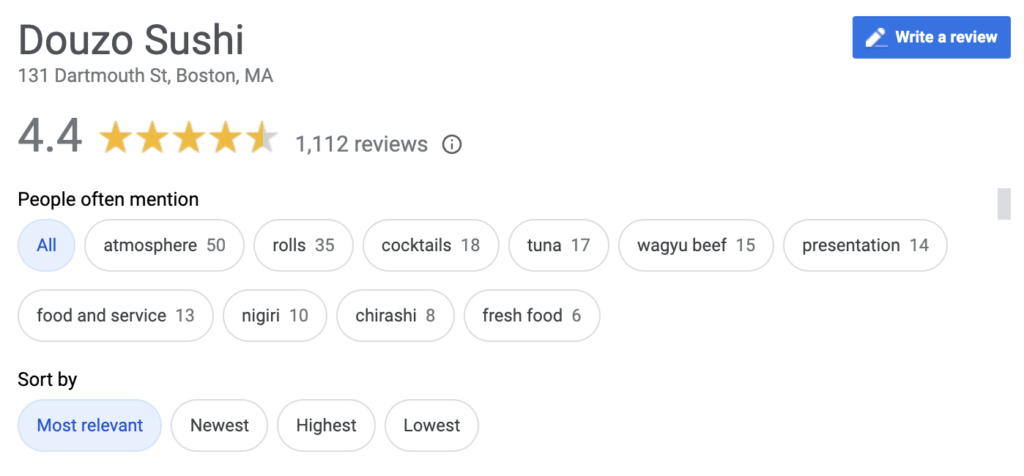
As seen in the screenshot, Google provides review breakdowns by service or product for various industries, it’s called “People Often Mention” section. In the case of restaurants, owners can use this data to identify the source of negative feedback. For example, while many reviewers might praise the restaurant’s atmosphere, negative comments might focus on a particular dish. Understanding these patterns enables targeted improvements.
Mistakes to Avoid When Handling Negative Online Reviews
By avoiding these mistakes, businesses can manage negative reviews more effectively and improve their reputation:
- Asking customers not to write and discouraging reviews, it can backfire.
- Being overly defensive in your replies can escalate and alienate customers.
- Making arguments or trying to justify yourself in response to negative reviews usually makes the situation even worse.
- Threatening legal action against reviewers or the platform is counterproductive.
- Posting positive (fake) reviews for your own business or asking employees to do so, it can damage trust if comes out.
- Using multiple profiles to manipulate reviews violates network terms.
- Paying for positive reviews, same as posting your own, is unethical and can lead to penalties from review platforms.
- Submitting too many removal requests at once can overwhelm the platform’s review team and influence their decision not in your favor.
Bottom line, using common sense is the key to handling reviews effectively and avoiding most mistakes that can backfire.
Example of How a Mistake in Handling a Negative Review Led to Escalation and Reputation Damage
Handling reviews requires careful consideration, as a single mistake can escalate conflicts and attract even more negative feedback crashing ratings. For example, we had a wedding services business client who faced an issue when an unhappy couple left a negative review on Google Maps and tagged the business in angry Instagram post. The business owner believed he was not at fault and that the couple was, in his words, “cheap” and received more value than they actually paid for. Responding defensively and emotionally, calling them “cheap”, the owner provoked the couple to post more negative reviews on Instagram and spread their negative feedback to other platforms like Yelp, Trustpilot, Pinterest, and Facebook.
As a result, both the bride and groom, along with their family and friends, left numerous reviews across various networks, leading to a significant drop in the business star ratings. During the busy summer wedding season, this not only damaged the company’s reputation but also led to a loss of business and the need to hire a reputation management service. This example shows how not to handle negative reviews and highlights the importance of avoiding quick, emotionally driven responses.
Why Are Policy Violating Reviews Still Approved and Visible on Review Sites?
Believe it or not, only a few review sites have strict manual review approval systems that include both manual and automatic verifications. Unfortunately, many platforms rely heavily on automatic approval processes and depend on users to report problematic and questionable reviews. This approach led to many controversies and even prompted the FTC to address the issue by working towards banning fake reviews and misleading feedback, question still remains if it’s possible and how it will be enforced.
Even on networks with strong approval rules, businesses must actively manage and report reviews. Many reviews can be on the edge of violating community guidelines and can be subject to interpretations. These reviews require multiple submissions and appeals to convince moderators that they indeed breach the rules and should be removed.
For example, one of our clients had a situation where a competitor posted well-written fake negative reviews. Despite their difficulty in spotting, it took numerous attempts and direct communication with the network to build a solid case and proof that these reviews were from competitor intended to damage the business.
Example of a Negative Inappropriate Review on Google Maps
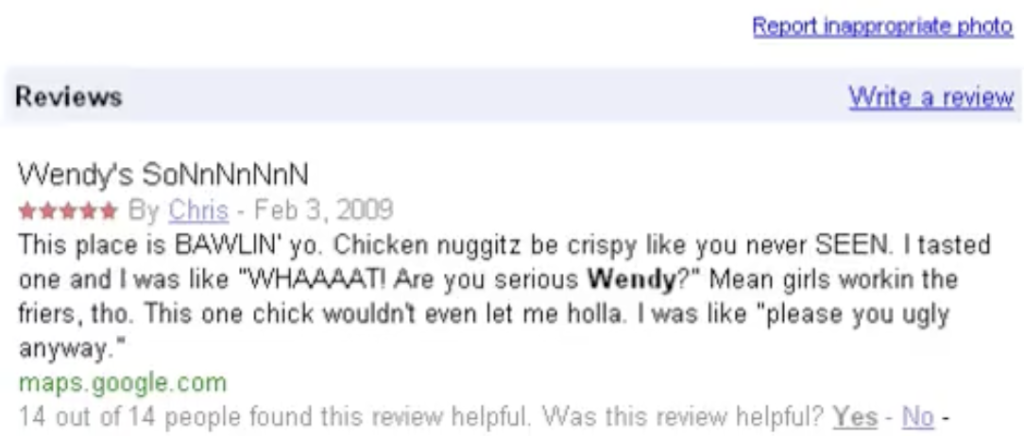
This review from a long time ago, it was totally inappropriate and stayed on Google for years. It even got voted as “helpful” by dozens of people. Business owners or reputable online reputation management (ORM) companies should address this type of content immediately.
Examples of Bad, Fake and Questionable Reviews Our Team Successfully Appealed and Removed
We’ve encountered various challenging reviews our customers faced and required our intervention.
Here are a some examples:
- A restaurant customer wrote a complaint on Google Maps claiming a server didn’t understand their language and made mistakes. The review also mentioned the national origin of the employee. This review was flagged for bullying, harassment, and discrimination. Google moderators removed it within 24 hours.
- At a car dealership, a customer left a negative review on Yelp naming an employee and providing detailed personal information like location, job title, and even physical appearance. This review was reported as a personal attack and a breach of privacy. It was successfully removed.
- A nightclub in Boston hired us after their ratings dropped below 3 stars, despite having nothing to do with poor service, in fact it was very friendly family owned place. Many reviews focused on complaints about their regular visitors, not the service itself. Reviewers criticized people’s appearance, age, drink choices etc, and often using terms like “trashy”, “low class”, “drunk”, and even racist slurs. We’ve seen it before, so we were not surprised that review platforms allowed this kind of feedback to go live. Reporting those reviews and improving the establishment’s ratings was an easy task for us, but it’s not always the case.
- In a Glassdoor review, an individual detailed their interview process and mentioned the exact job titles of each interviewer. This level of detail made it easy to identify who was responsible for hiring, their personal interview styles, and the questions they asked. The reviewer, who did not receive the job offer, criticized some of the interviewers, questioning their knowledge and suitability for their positions. This review was reported by our team and removed.
Handling these types of situations requires close attention and understanding of each platform’s policies to effectively protect your reputation online.
Is It Ethical to Report and Delete Bad Online Reviews?
People might wonder about the fairness and ethics of this, we value free speech, right? On most reputable review platforms, businesses can respond and flag reviews they think are unfair or against the rules. It’s common for companies to challenge negative feedback that could hurt their online reputation. Think of it like hiring a lawyer to figure out about a disagreement, sometimes it’s about protecting your business, no matter who’s right or wrong.
In fact, most reputable review removal companies and experts advise against flagging and removing all reviews. Instead, they recommend professionally responding to reviews from real customers who offer honest feedback about their interactions with the business, including what went wrong and how it could be improved. They also suggest encouraging satisfied customers to leave more reviews to enhance the overall feedback.
Reviews should only be flagged and removed if they are believed to be false, misleading, or in violation of guidelines, such as containing inappropriate content. This approach is considered ethical, as it addresses questionable, fake and fraudulent reviews while respecting real and genuine customer feedback.
Building a Positive Online Reputation Before Bad Reviews Strike
Dealing with negative content involves continuously managing your reputation in-house or by hiring an online reputation management (ORM) firm. This approach ensures that when negative reviews arise, the positive feedback you have accumulated over the years can outweigh a few bad reviews or content, minimizing their impact.
To achieve this, businesses should:
- Encourage Positive Reviews. Actively ask satisfied customers to leave reviews across various platforms. Stronger reputation means higher chance of getting negative reviews removed because moderators
- Respond to Negative Feedback. Address negative reviews and content promptly and professionally, showing great service and support.
- Report and Remove Old Reviews. Make sure to flag outdated or inaccurate reviews (even from years ago), seeking their removal to maintain current and accurate perceptions. Remember that old reviews still affect the overall star ratings.
Leveraging search engine optimization (SEO) is crucial:
- Optimize Positive Content. Regularly publish quality content that showcases your positive customer experiences, making sure it ranks well in search results.
- Monitor Search Results. Continuously monitor search engine results to manage and promote positive content, effectively overshadowing any potential negativity.
By integrating these strategies, businesses can build a strong online reputation that can withstand even some negativity that might arise in the future.
Also, a strong online reputation significantly improves the chances of successfully removing online negative reviews. Sometimes moderators and review platforms prioritize businesses with a positive online presence and a history of positive feedback when considering review removal requests. That’s why, cultivating and maintaining a positive reputation can act as a protection against the impact of negative reviews on your business.
Why Businesses Struggle to Respond and Flag Negative Reviews Effectively
From our experience, over 60% of companies don’t manage or reply to online reviews, while another 25% do so inconsistently. When we receive requests to manage or remove negative reviews, we hear different stories. Often, new management at the company asks for help with reviews that were never responded to or reported by the previous team, sometimes who may not even claimed their profiles. Often, we find that the previous team neglected not only reviews but also other aspects of digital marketing. And as a result, the entire company needs an overhaul of its digital presence.
We also encounter situations where reviews were well managed in the past, but the company stopped for a period of time and is now trying to regain lost reputation. This happens with loss of motivation or when the person or team responsible for managing reviews leaves, and no one takes over their duties.
Additionally, conflicts between departments can cause neglect in online review management and response. For example, in a financial institution we worked with, customer service team wanted to control and respond to reviews but didn’t have the proper expertise. Meanwhile, the PR and marketing team refused to help, citing that it’s the customer service team responsibility to handle unhappy customers. This type of misunderstanding often leads to mismanagement and neglected online reviews.
Lastly, some business owners mistakenly believe that managing reviews requires paying networks to control and remove them. They don’t realize that managing reviews, especially flagging and reporting them, is free.
Why It’s Beneficial to Hire a Professional Negative Review Removal Service

Hiring a professional negative review removal service and reputation management company gives several advantages. Firstly, it saves a lot of time by quickly addressing any review issues. These consulting services are well prepared and knowledgeable about the review removal process, understanding all the rules and network’s interpretations, which improves the chances of successful appeals. Additionally, they monitor multiple platforms and react accordingly to any new updates. It’s similar to hiring someone to manage your website or create a design. The last thing any business owner wants is to update content or learn Photoshop themselves. So, why managing your own reviews when you can give it to professionals who’ll do it quicker and more efficient.
Many businesses hesitate to hire a review removal or reputation management company, mistakenly believing it is an easy task… and that someone in marketing, PR, or HR can handle it alongside their daily responsibilities. However, this is not the case, and many businesses learn this hard way. Their reputation can suffer a lot due to fake reviews or issues that escalate because responses were not timely or appropriate, often resulting in even more negative reviews and content.
With outsourcing this task to a professional reputation management service company, business owners can alleviate the pain. This allows business owners to concentrate on their main business activities without waisting their time on online reputation management efforts and responding to each negative content situation.
In addition, by partnering with a reputable reputation management service, business owners can streamline their online presence management, maintain a positive brand image, and focus on driving sales, growth and success in their company.
Need Assistance Removing Bad and Unfair Reviews?

We handle the process of appealing and removing negative reviews about your company. Payment is due only upon successful removal.
Wondering About the Cost of Review Removal Services from a Professional Company?
With most companies, you only pay after they remove the review. However, some services may require a small service fee regardless of success. RetainTrust only charges for our services after the successful review and content removals without additional fees. We believe in paying for results, not just promises. Our approach ensures that your investment is effective, we only charge when we deliver. It’s straightforward, if we can’t get it taken down, you don’t pay!
Why Hiring RetainTrust Is a Smart Investment for Managing and Removing Bad Reviews
If you need professional advice in review removal and reputation management, you’ve come to the right place. RetainTrust team will carefully listen, assess your situation, ensure the reviews are responded or removed, and do our best to prevent it from happening again. Next time, your business will be protected from any type of negative content, whether from disgruntled employees, competitors, scammers, spammers, or other “bad actors”. Additionally, we analyze all reviews to identify gaps for improvement and avoid similar situations in the future. We also look for your strengths to promote and highlight, helping you get better reviews and improving your overall reputation and web visibility.






